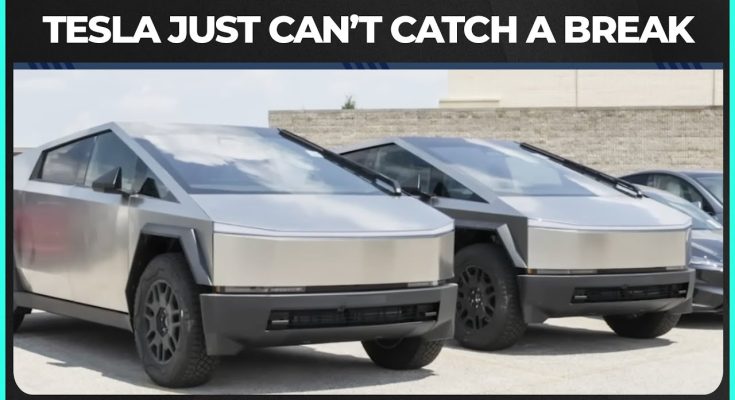Tesla’s highly anticipated Cybertruck has hit a massive roadblock, as nearly all units have been recalled due to faulty parts. The recall, which affects thousands of Cybertrucks already delivered, raises serious questions about Tesla’s quality control, production process, and the long-term viability of the futuristic vehicle. On The Young Turks, hosts Jackson White, Mark Thompson, and Ben Gleib dissected the recall, its implications for Tesla’s reputation, and what it means for the future of the electric vehicle (EV) market.
The Scope of the Recall
The recall involves nearly all Cybertrucks that have been shipped to customers so far. The primary issue reportedly stems from a defect in the accelerator pedal, which can become stuck, potentially leading to unintended acceleration. Such a flaw poses significant safety risks, making an immediate recall necessary.
Tesla, under the leadership of CEO Elon Musk, has often taken a “move fast and fix later” approach to production, prioritizing innovation over traditional auto industry testing standards. While this strategy has worked in the past, allowing Tesla to push the boundaries of EV technology, the Cybertruck recall highlights the potential downsides of this approach—especially when it comes to vehicle safety.
The Young Turks’ Take on the Issue
During their discussion, Jackson White pointed out that Tesla’s frequent recalls and production challenges indicate deeper systemic problems within the company. He emphasized that while Tesla remains a leader in the EV space, its tendency to rush products to market without rigorous testing continues to undermine its credibility.
Mark Thompson added that the recall raises concerns about the Cybertruck’s overall design and engineering. Given that the vehicle is already controversial due to its unconventional look, stainless steel body, and polarizing features, a major safety recall could further alienate potential buyers. Thompson also noted that Musk’s erratic leadership style, combined with Tesla’s history of overpromising and underdelivering, has left some consumers skeptical about the Cybertruck’s reliability.
Ben Gleib chimed in, criticizing Tesla’s handling of the recall. He argued that while recalls are common in the auto industry, the fact that nearly every Cybertruck is affected suggests serious flaws in Tesla’s quality control measures. Gleib also pointed out that Tesla’s brand image relies heavily on Musk’s cult-like following, but with growing competition from legacy automakers entering the EV space, Tesla can no longer afford to take these kinds of risks without consequences.
What This Means for Tesla and the EV Market
The Cybertruck recall could have broader implications for Tesla’s dominance in the EV industry. As more automakers, including Ford, GM, and Rivian, produce their own electric trucks, Tesla can no longer rely solely on brand loyalty to maintain its market share.
Additionally, with Musk’s frequent controversies and distractions—including his involvement in social media politics and AI ventures—some investors are beginning to question whether Tesla’s leadership is focused enough to maintain its competitive edge.
Moving forward, Tesla will need to address these quality control issues head-on, reinforcing consumer confidence in its products. Otherwise, the Cybertruck—once hyped as the future of electric trucks—could become a symbol of Tesla’s growing pains rather than its success.

